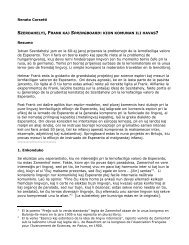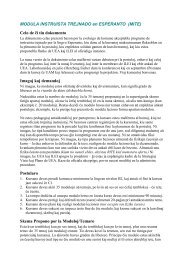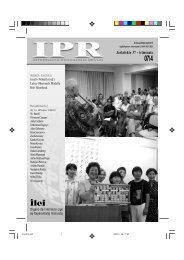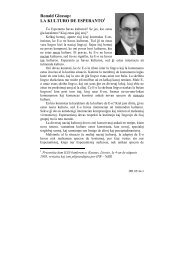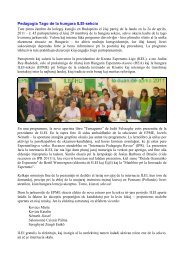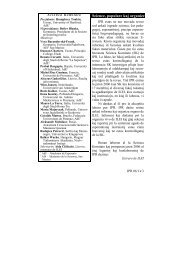Prof. Humphrey Tonkin University of Hartford, USA tonkin ... - ILEI
Prof. Humphrey Tonkin University of Hartford, USA tonkin ... - ILEI
Prof. Humphrey Tonkin University of Hartford, USA tonkin ... - ILEI
You also want an ePaper? Increase the reach of your titles
YUMPU automatically turns print PDFs into web optimized ePapers that Google loves.
5<br />
Arguments from national priorities. In today’s integrated world, the globalization <strong>of</strong><br />
crime and violence advances in step with the positive aspects <strong>of</strong> globalization. For reasons<br />
<strong>of</strong> national security, the United States must be well equipped to understand the languages<br />
and the attitudes <strong>of</strong> friends and opponents. Without a strong reserve <strong>of</strong> language capability,<br />
the country will be caught short by outbreaks <strong>of</strong> hostility or <strong>of</strong> violence in distant parts <strong>of</strong><br />
the world, or by the need to make new friends and alliances. Such arguments from national<br />
policy play particularly well with funders in Washington, who, aware <strong>of</strong> the need for<br />
language readiness, are eager to invest in programs to achieve it. For their part, language<br />
teachers are eager to play to arguments that will produce funding and accordingly may give<br />
too much support to the notion that language teaching in schools can do much for language<br />
needs in government or the armed forces. But the volatility <strong>of</strong> international affairs makes it<br />
impossible to predict where language needs will next arise. In the past few years, Somali has<br />
come and gone, Pashtu has peaked and is declining, Kurdish has risen, Vietnamese has<br />
fallen. By the time the learner has acquired the language, its relevance has evaporated. Even<br />
major languages pass through peaks and valleys <strong>of</strong> popularity as world affairs shift. One<br />
could certainly make the argument that Arabic will maintain its importance as a language skill<br />
for years to come, or that Chinese will – but tell that to the Russian speaker laid <strong>of</strong>f from the<br />
State Department or the local university.... In this area, as in the first <strong>of</strong> our four clusters <strong>of</strong><br />
arguments, the best way <strong>of</strong> building language skills is by assisting the linguistically talented in<br />
developing language-learning skills in general or in the context <strong>of</strong> a family <strong>of</strong> languages, so<br />
that they can readily acquire a working knowledge <strong>of</strong> a language in minimum time. It also<br />
goes without saying that the United States should overcome its ambivalence about<br />
employing immigrants with native competence in these languages.<br />
Clearly, in the design <strong>of</strong> an educational program, these four clusters <strong>of</strong> arguments point in<br />
contradictory directions. It is worth noting that more or less none <strong>of</strong> them point to actual<br />
mastery, or at least that the most convincing arguments for school-based instruction do not.<br />
A tiny minority <strong>of</strong> students passing through American schools can be said to have mastered<br />
their foreign language or languages. Nor do these clusters <strong>of</strong> arguments <strong>of</strong>fer much<br />
guidance on which languages to teach. Given that the U.S. education system is highly<br />
decentralized, with many curricular decisions being made at the local level, local priorities are<br />
likely to dominate. For example, areas with large numbers <strong>of</strong> Chinese immigrants are likely<br />
to be those whose schools <strong>of</strong>fer Chinese – though schools in affluent areas, where parents<br />
want their children to enjoy an advantage in global employment, may also see Chinese as an<br />
attractive option, perhaps unaware <strong>of</strong> how little Chinese their children are likely to acquire in<br />
the disjointed schedule <strong>of</strong> isolated hourly segments that is typical <strong>of</strong> most schools.<br />
Furthermore, again because <strong>of</strong> the decentralization <strong>of</strong> the system, children who move from<br />
one area <strong>of</strong> the country to another are likely to be left high and dry if they choose a less<br />
commonly taught language, and this dislocation may put them at a disadvantage in acquiring<br />
even the limited knowledge <strong>of</strong> a language required for entry to the more selective<br />
universities.<br />
But the biggest single problem faced by advocates <strong>of</strong> language learning is simply the<br />
dominance <strong>of</strong> English on the world scene. It is hard to convince parents that foreign<br />
language matters, or that it will be useful, or that in itself it is an educationally useful skill.<br />
Fortunately, as the United States’ role in the world has grown, so too has the political<br />
awareness <strong>of</strong> language teachers, who over the past few years have become considerably more



